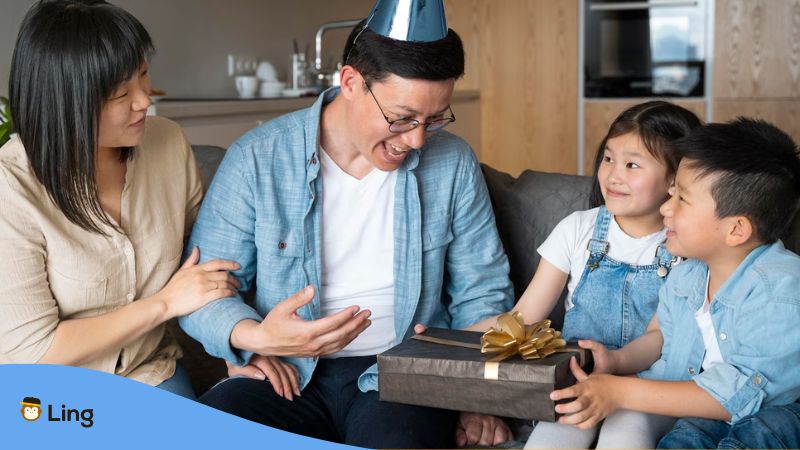Did you know that Mother’s Day and Father’s Day in South Korea are combined into a single celebration called Parents’ Day? That’s right!
It’s called 어버이날 (Eobeoinal). This particular day shows love, gratitude, and appreciation for both parents. But how did this unique celebration come about?
What makes it so special in Korean culture? Well, stick around, and you’ll find out!
Today, we’ll take you through the history and origin of this holiday. We’ll discuss the traditional customs and modern celebrations too!
Want to impress your Korean friends or family with heartfelt Parents’ Day greetings? No problem!
We’ll help you learn Korean phrases and examples for wishing someone a Happy Father’s Day in Korean.
Ready to learn more about this meaningful celebration in the Land of the Morning Calm? Let’s get started!
History And Origin Of Father’s Day In Korea
You might wonder how Parents’ Day in Korea came to be. Let’s take a stroll down memory lane and dig into its origin.
Evolution From Mother’s Day To Parents’ Day
So, how did it all begin? The roots of Parents’ Day can be traced back to the 1930s when a group of people in Korea started celebrating Mother’s Day.
The idea caught on, becoming a popular tradition to honor mothers and express gratitude for their love and sacrifices.
But, in 1956, something interesting happened.
Korean society decided to make a change and shifted the focus from solely celebrating mothers to honoring both parents.
That’s when Mother’s Day transformed into the celebration we now know as Parents’ Day. They celebrate Mother’s Day and Father’s Day in one go!
Official Designation As A Public Holiday
But wait, there’s more! In 1973, the South Korean government recognized the importance of Parents’ Day and declared it an official public holiday.
This move further cemented the significance of parents in Korean society and demonstrated the country’s commitment to family values.
Now, every year on May 8th, Koreans celebrate and honor their parents with various customs and traditions.

Essential Korean Phrases For Father’s Day
Now that you know the history of Parents’ Day in Korea, why not learn some essential Korean phrases to make the day even more special?
This is perfect for those who want to express their love and gratitude to their parents in Korean.
Greetings And Well-Wishes
First, let’s go through some lovely phrases to greet Happy Father’s Day in Korean.
Remember, these phrases can also be used in Parents’ Day celebrations.
- 행복한 아버지 날 되세요 (Haengbokan Abeoji Nal doeseyo) – This phrase means “Happy Father’s Day.” It’s perfect for showing your affection on this special occasion.
- 행복한 어버이날 되세요 (Haengbokan Eobeoinal doeseyo) – This translates to “Happy Parents’ Day” and is a fantastic way to celebrate both parents.
- 사랑하는 아버지께 (Saranghaneun Abeojikke) – Use this phrase, which means “To my loving father,” as a heartfelt introduction to your Parents’ Day message.
- 오늘은 아버지의 날입니다 (Oneureun Abeoji-ui Nal-imnida) – This phrase means “Today is Father’s Day” and can be used to remind someone of the special day.
- 아버지, 감사합니다 (Abeoji, gamsahabnida) – A simple yet powerful expression, this phrase means “Father, thank you” and is perfect for expressing your gratitude.
- 아버지를 생각하는 날 (Abeojireul Saenggakhaneun Nal) – This phrase translates to “A day to think about father.” It highlights the importance of remembering and appreciating your father.
- 아버지와 함께하는 어버이날 (Abeojiwa Hamkke-haneun Eobeoinal) – This means “Parents’ Day with Father” and is great for emphasizing the significance of spending time together on this special day.
Expressing Gratitude
Now, let’s learn some heartwarming phrases to express gratitude and appreciation in Korean towards your parents. Here are some examples:
- 정말 고맙습니다 (Jeongmal Gomapseumnida) – This phrase means “I’m truly grateful” and is an excellent way to convey your heartfelt appreciation.
- 항상 고마워요 (Hangsang Gomawoyo) – This translates to “Thank you always,” emphasizing your continuous gratitude toward your parents.
- 부모님 덕분에 행복합니다 (Bumonim Deokbune Haengbokhamnida) – This phrase means “I’m happy because of my parents.” It demonstrates how much their love and support mean to you.
- 언제나 감사드립니다 (Eonjena Gamsadeurimnida) – This phrase means “I’m always grateful to you” It’s another beautiful way to express your constant appreciation.
- 부모님께 큰 힘이 되어 드리고 싶어요 (Bumonimkke Keun Himeuro Deuryeogosipeoyo) – This phrase translates to “I want to become a great support for my parents,” showing your willingness to give back to them.
- 항상 응원해 주셔서 감사합니다 (Hangsang Eungwonhae Jusyeoseo gamsahabnida) – This phrase means “Thank you for always supporting me.” It’s a lovely way to acknowledge your parents’ encouragement and guidance.
- 사랑과 지지에 감사드립니다 (Saranggwa jijie gamsadeurimnida) – This translates to “Thank you for your love and support,” expressing appreciation for the emotional and practical assistance your parents have given you throughout your life.

Celebrating Parent’s Day In Korea
Now that you’ve learned some touching Korean phrases, let’s see some unique ways South Koreans honor their parents on this special day.
From traditional customs to modern celebrations, there’s plenty to explore and appreciate about this family-centered holiday.
Traditional Customs And Practices
To begin, let’s look at the traditional customs and practices associated with Parents’ Day.
These time-honored traditions are essential to Korean culture and help maintain strong family bonds.
Red Carnations As Symbols Of Love And Gratitude
In Korea, red carnations (카네이션, kaneisyeon) are often used to express love and appreciation toward parents.
Children may present their parents with a bouquet or wear a carnation pinned to their clothing to symbolize respect and gratitude.
It’s wonderful how a simple flower can convey such powerful emotions!
Acts Of Service And Spending Time With Parents
On Parents’ Day, many Koreans show their love and appreciation by performing acts of service for their parents.
This may include cooking Korean foods, helping with household chores, or spending quality time together.
After all, what could be more precious than giving the gift of time and care to the ones who raised us?
Modern Celebrations
As times have changed, so has the way Koreans celebrate Father’s Day.
Let’s explore some contemporary trends and customs from this memorable holiday.
Gift-Giving Trends
While red carnations remain popular, many people now opt for more practical gifts (선물, seonmul) to show their appreciation on Parents’ Day.
This may include health products, clothing, or even experiences such as spa days or vacations. It’s all about finding that perfect gift and showing how much you care.
Dining Out And Family Gatherings
Another modern way of celebrating Parents’ Day is by organizing family gatherings (가족 모임, gajok moim) or dining out at restaurants.
This not only provides a chance for parents to relax and enjoy a delicious meal, but it also offers an opportunity for families to reconnect and create lasting memories together.

The Role Of Fathers In Korean Society
Fathers play a crucial role in Korean society, don’t they? Traditionally, they’ve been the primary breadwinners and decision-makers in the family.
But as time passes, we’ve seen some significant changes in the expectations and responsibilities of Korean fathers.
Let’s take a closer look at this evolution, shall we?
Traditional Expectations And Responsibilities Of Korean Fathers
In the past, Korean fathers were expected to shoulder the financial responsibility of providing for their families.
They were the 아버지 (abeoji), or head of the household, making crucial decisions for the family’s well-being.
It wasn’t just about earning money; Korean fathers were also expected to uphold the family’s reputation and maintain harmony within the household.
But with societal changes and modernization, these traditional roles have been evolving.
How, you ask? Let’s explore this further.
The Changing Image Of Fatherhood In Modern Korea
Today, Korean fathers are redefining their roles in the family. They’re becoming more involved in parenting, taking on tasks once considered the mother’s domain.
From diaper-changing to bedtime stories, Korean dads are embracing the joys and challenges of fatherhood.
They’re even picking up cute nicknames like 아빠 (appa), a more affectionate term for “dad” in Korean.
Contemporary Korean fathers also recognize the importance of work-life balance.
They strive to spend quality time with their children and be present for their families.
This shift is reflected in policies such as paternity leave, which encourages dads to take an active role in their children’s early years.
What’s more, Korean fathers are now offering emotional support and guidance to their adult children, fostering open communication and understanding within the family.
This modern image of fatherhood in Korea is a far cry from the stern, distant figure of the past.
Useful Vocabulary For Father’s Day In Korea
Ready to brush up on your Korean for Father’s Day or Parents’ Day? Let’s learn some vocabulary that’ll help you feel more connected to this special occasion.
| English | Korean | Pronunciation | Sound |
| Blessing | 축복 | Chuk-bok | |
| Family | 가족 | Ga-jok | |
| Grateful | 감사한 | Gam-sa-han | |
| Happiness | 행복 | Haeng-bok | |
| Hug | 포옹 | Po-yong | |
| Love | 사랑 | Sa-rang | |
| Memory | 추억 | Chu-eok | |
| Parent | 부모님 | Bu-mo-nim | |
| Respect | 존경 | Jon-gyeong | |
| Wisdom | 지혜 | Ji-hye |
There you have it! How about putting them to good use?
With a little practice, you’ll be able to fully embrace the spirit of this special day and maybe even surprise those around you with your growing language skills.
Learn More About Father’s Day In Korean With Ling!
So, you’ve learned the ins and outs of Father’s Day in Korean, exploring its rich history, traditions, and language.
It’s impressive how a seemingly simple celebration like Father’s Day can offer insight into Korean culture and family values.
Try out some of those Korean phrases you’ve learned today. Your parents will definitely appreciate the gesture!
But hey, why limit yourself?
If you’re eager to learn Korean and 60+ languages and their cultures, the Ling app is here to help.
With interactive lessons, entertaining games, and practical vocabulary, you’ll be mastering new languages in no time!
So go ahead, get the app from Google Play and App Store, and make every day a celebration of learning. 화이팅! (hwa-i-ting, go for it!)



































































